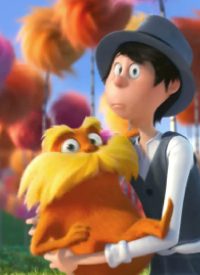
Dr. Seuss’ The Lorax is a film about the disappearance of trees, which have since been replaced by imitations, and the pursuit of two teens anxious to get their hands on some real live greenery. Therefore, there is a predictable environmentalist undertone coupled with anti-capitalist sentiment. However, the film’s anti-tyrannical subtext and focus on friendship and peace may just redeem the movie for some audiences, and its innocence and entertainment value could make it a prime choice for this weekend’s family film.
The Lorax focuses on a young high school student named Ted (Zac Efron) who is trying to win the affections of his crush Audrey (Taylor Swift) by granting her biggest desire: to see a real tree. In their town of Thneedville, real trees are no longer in existence, as the town is highly industrialized, and none of the residents seem to recall the exact moment or cause for the trees’ disappearance.
Thneedville is a walled up city ruled by the tyrannical Mayor O’Hare (Rob Riggie), who is also the head of O’Hare Air, which supplies the highly polluted Thneedville with clean air. Government collusion at its best … bears a stark similarity to the Chicago Climate Exchange and its close ties to President Obama, but I digress.
The reason Thneedville is so polluted is because of the Once-ler (Ed Helms), the town’s industrialist who created a garment made from the threads of the Truffula tree, called thneed. The items became so popular that the region eventually lost all of its trees.
In other words, using natural resources to create products for consumers will end in catastrophe. And to drive the point home, there is an upbeat children’s song.
Ted enlists the help of his kooky grandmother (Betty White), who helps him to escape the town of Thneedville in search of trees. Once outside of Thneedville, Ted goes in search of Once-ler, who has since been exiled outside of town and lives rather poorly. It’s Once-ler who informs Ted about the Lorax (Danny Devito), the creature that guards the forest.
The film focuses on Zac’s quest, which is not ideological in nature but driven by love. Still, one could not escape the ideological undertones throughout the film.
The Lorax espouses a number of valuable themes. First, it emphasizes that God’s creation has value and should be respected. It also drives home the importance of friendship and reconciliation. In fact, the film is ultimately about second chances, most notably when it comes to the world and the way in which we treat it.
It also provides a more realistic backdrop for the story than one would normally find in a children’s story like this one. Ted’s mother does not appear to have all of her faculties, and Ted’s father is inexplicably absent, though that theme seems to characterize a number of Dr. Seuss’s stories. Similarly, Once-ler’s familial relationships are fractured, with his parents seemingly unsure how to love him and his mother admitting that she always felt her son would be a disappointment. Not exactly the pinnacle of motherly love.
The environmental message is one that would make President Obama’s science czar John Holdren very pleased. The Lorax declares himself to be the speaker of the trees, and comes off a bit gruff, though in the film, his harsh exterior is rightfully so, since the townspeople have been an utter disappointment by sitting idly by and watching the destruction of the town. But the ways in which the humans have allegedly mistreated the Earth in The Lorax seem to be directly related to capitalism — the building of wealth and the use of natural resources.
In fact, the environmental message is so strong that Lou Dobbs of the Fox Business network has already blasted it for attempting to “indoctrinate our children.”
Dobbs’ assertions are not entirely unfounded. Apparently, Dr. Seuss’ book The Lorax sparked some controversy in the 80s. In 1988, school district in California included the book on a reading list for second graders, but some of the townspeople said the book took an unfairly critical view of the logging industry. By 1991, the dispute prompted Terri Birkett, a member of a flooring factory, to write a counter-tale to Seuss’ Lorax, entitled the Truax, which took a logging-friendly perspective. That heated controversy was not just limited to the small district in California, but characterized a number of districts throughout the nation.
Furthermore, Dr. Seuss himself classified The Lorax as “propaganda,” leaving little to be analyzed as to the book’s intent.
Still, The Lorax also includes anti-totalitarian sentiments, likely stemming from Dr. Seuss’s passionate opposition to fascism, which was reflected in his early political cartoons during World War II, where his anti-fascism views were evident, as well as his belief that the fear of communism was a bit overrated. Perhaps that explains his propensity towards extreme environmentalism, as contrasted with genuine conservationism.
The problem with films like The Lorax is that it packages a strictly liberal message in a cute and visually gripping masterpiece, thereby lulling audiences into a sense of security and allowing them to let down their guard long enough to be indoctrinated. The entire film from start to finish is aesthetically pleasing .
Likewise, many of the characters in the film are adorable and endearing. Even the Lorax, despite his brash personality, has a certain inexplicable charm.
The plot and action in the film are also entertaining and thrilling and overall, highly imaginative.
The film has all the qualities of a well-made movie, but its message targeting capitalists as automatic enemies of the environment is sure to scare away just enough moviegoers.
What may be redemptive, however, is this. The Lorax seems particularly geared for very young moviegoers who may not understand the depths of the environmental message, except that trees are pretty and that it would be bad to cut down every last one of them, a notion with which all of us would certainly agree. If that is the message with which children exit the theaters, there should be no problem. But if they were to somehow understand the underlying assertion that there is a cause-and-effect relationship between the destruction of the Earth and industrialism/capitalism, parents should prepare themselves for some de-programming to follow.
Some of the other messages found in the film are indeed valuable. It emphasizes the notion that so long as people are willing to sit by idly while destruction is taking place, on any scale, nothing will change.
When the children discover the last seed to a Truffula tree, they are told, “It’s not what it is. It’s about what it can become,” almost reminiscent of Shakespeare’s immortal words, “We know what we are, but know not what we may be.” It provides a valuable metaphor particularly for young audiences, that we are all seeds with potential.
The Lorax proves yet again that there is far more depth to Dr. Seuss’s tales than what meets the eye. He had a genius that went far beyond his ability to write entertaining children’s stories. He had a striking ability to write allegorical and critical pieces without having them appear as such, but that same skill could be dangerous if the wrong message is reaching children. Therefore parents should approach this film, in the same way they approach any film, and any children’s book for that matter: with a bit of caution and fully prepared to present their children with counter-criticism.




